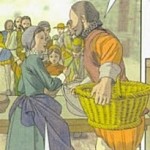Saint Jane de Chantal served the poor, marginalized and underprivileged all her life, both as wife and widow and as foundress of the Visitation Order of Holy Mary.
She taught her Sisters to do the same.
 “St. Chantal’s daughters were not content with raising their hands to heaven and disarming divine justice by their supplications, they fed the poor, instructed the ignorant, converted the impious, consoled the afflicted—in a word, fulfilled through their grates and in spite of their inviolable inclosure, all the duties of Christian charity, with intelligence as to the wants of the times and the true spirit of their Institute that was surpassed only by their devotedness.
“St. Chantal’s daughters were not content with raising their hands to heaven and disarming divine justice by their supplications, they fed the poor, instructed the ignorant, converted the impious, consoled the afflicted—in a word, fulfilled through their grates and in spite of their inviolable inclosure, all the duties of Christian charity, with intelligence as to the wants of the times and the true spirit of their Institute that was surpassed only by their devotedness.
True, they were no longer seen, as in the first days of the foundation at Annecy, traversing the streets, laden with food, clothing, and remedies for the sick; but if they could no longer go to the poor, the poor could come to them in crowds to the convent parlors.
There Anne-Jacqueline Coste used to receive them, range them in rows, and distribute to them with some kind words the bread, meat, and remedies prepared for them in the convent. She had wonderful tact in obtaining from friends all that the poor needed. Nor was she less successful with the Sister Procuratrix of the community. If the latter tried sometimes to evade her, she had recourse to St. Chantal, who always listened to her petition, and often went herself to the store-room and pantry, to beg for the poor. “My daughter,” she would say to the Sister in charge, “give me, in the name of Our Lord, such and such a thing for our poor;” and then, full of joy, she would take it to Sister Anne-Jacqueline, saying with a sweet smile: “I am a better beggar than you. See what they have given me!”
It was our saint’s wish that the poor should not be refused. “Yes, my child,” was her ordinary answer when any one came to ask her permission for some charity, “yes, give alms to Our Lord and for His love.” If the Sister Procuratrix ventured a remark, she was met with “Give freely, and you will find at the end of the year that your expenses will not be greater than usual.” She directed the Sister in charge of the linen to lay aside for her all the old chemises, and she mended them with her own hand. Had they allowed her, she would have learned from the Sister Shoemaker how to repair old shoes for the poor.
 One year, when provisions were high, she assembled the Sisters and asked them whether they would not be glad to prolong their Lent after Easter, in order to have means to assist the poor; and another year (it was during the plague) she gave the community black bread, that the poor victims might be the more bountifully relieved.
One year, when provisions were high, she assembled the Sisters and asked them whether they would not be glad to prolong their Lent after Easter, in order to have means to assist the poor; and another year (it was during the plague) she gave the community black bread, that the poor victims might be the more bountifully relieved.
From Annecy this spirit of charity spread throughout the whole Order. At Rouen the novices put together all their watches, jewels, and trinkets, to form a little fund for the poor. When St. Chantal heard it, she exclaimed: “Ah! my heart melts with gratitude toward those good children!” At Puy the Sisters unanimously resolved to fast, in order to be able to assist the necessitous. St. Chantal covered with kisses the letter that conveyed this news. “This,” she said, “has come from the heart of a true daughter of the Visitation.” She carried the letter in her girdle for several days, “to offer,” she said, “these good and charitable daughters to God, that His goodness may bless me, as well as them.”
The charity of St. Francis de Sales’ daughters was enlightened, as well as heroic. They saw not merely the rags, the corporal misery of the poor; they did not deem their debt of charity paid by giving to the unfortunate a morsel of bread to eat or a bundle of straw to lie on. Under his rags they saw his soul, and in his soul wounds a thousand times more cruel and shameful than those that disfigured his body. It was by the advice of the good Out-Sister Anne Jacqueline that St. Francis de Sales determined to give daily catechetical instructions to the poor. Anne-Jacqueline assisted at them, constituting herself, if we may so say, the police. After the Bishop’s death, she continued these instructions herself. Every Sunday she gathered the poor in the convent parlors, heard their catechism, and gave to each a trifling alms. They did the same in Lyons, Puy, Clermont, Montferrand, Turin, and, indeed, wherever there was a convent of the Visitation.”
Source:
St. Chantal and the foundation of the Visitation, Volume 2
By Emile Bougaud